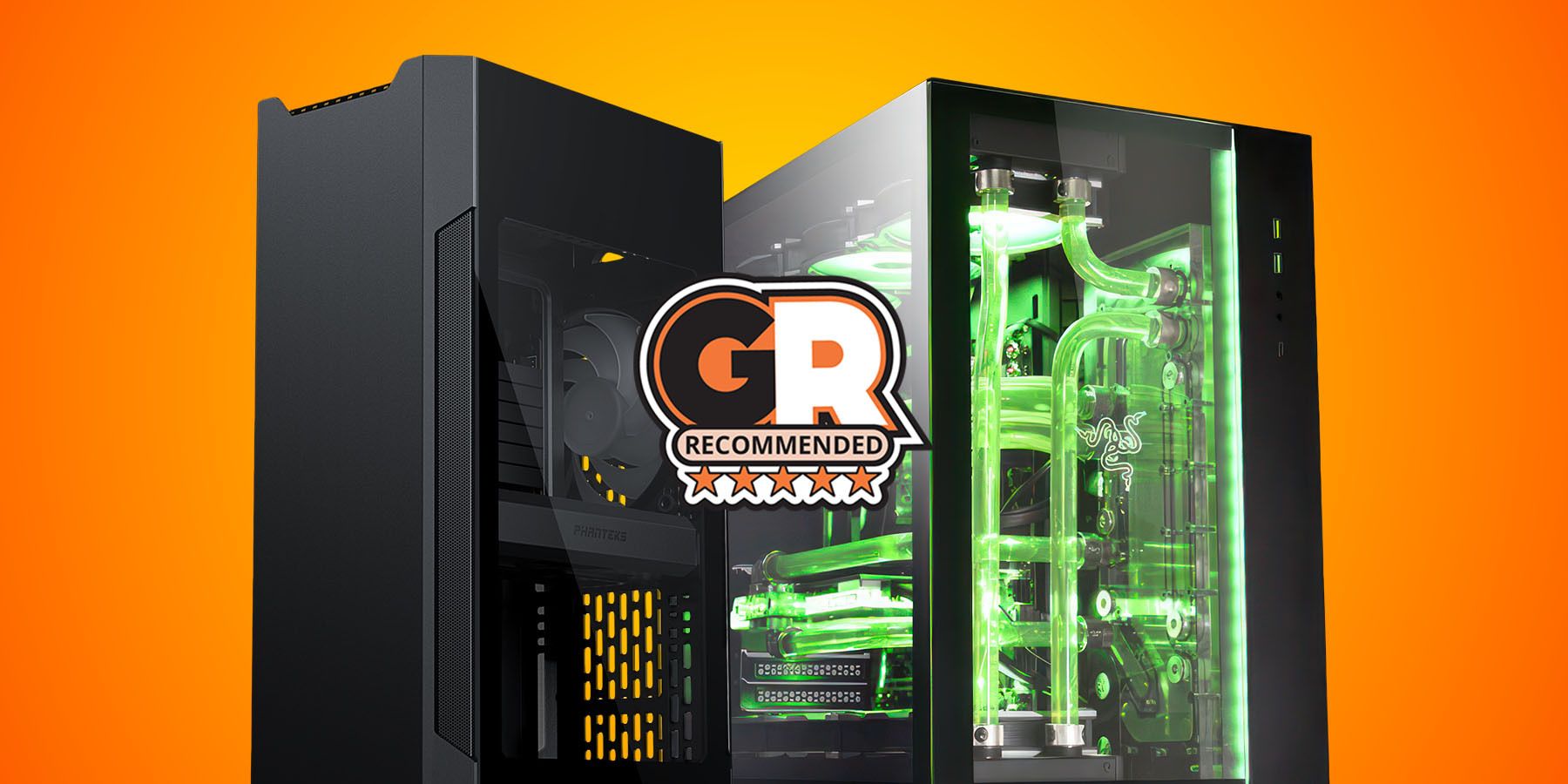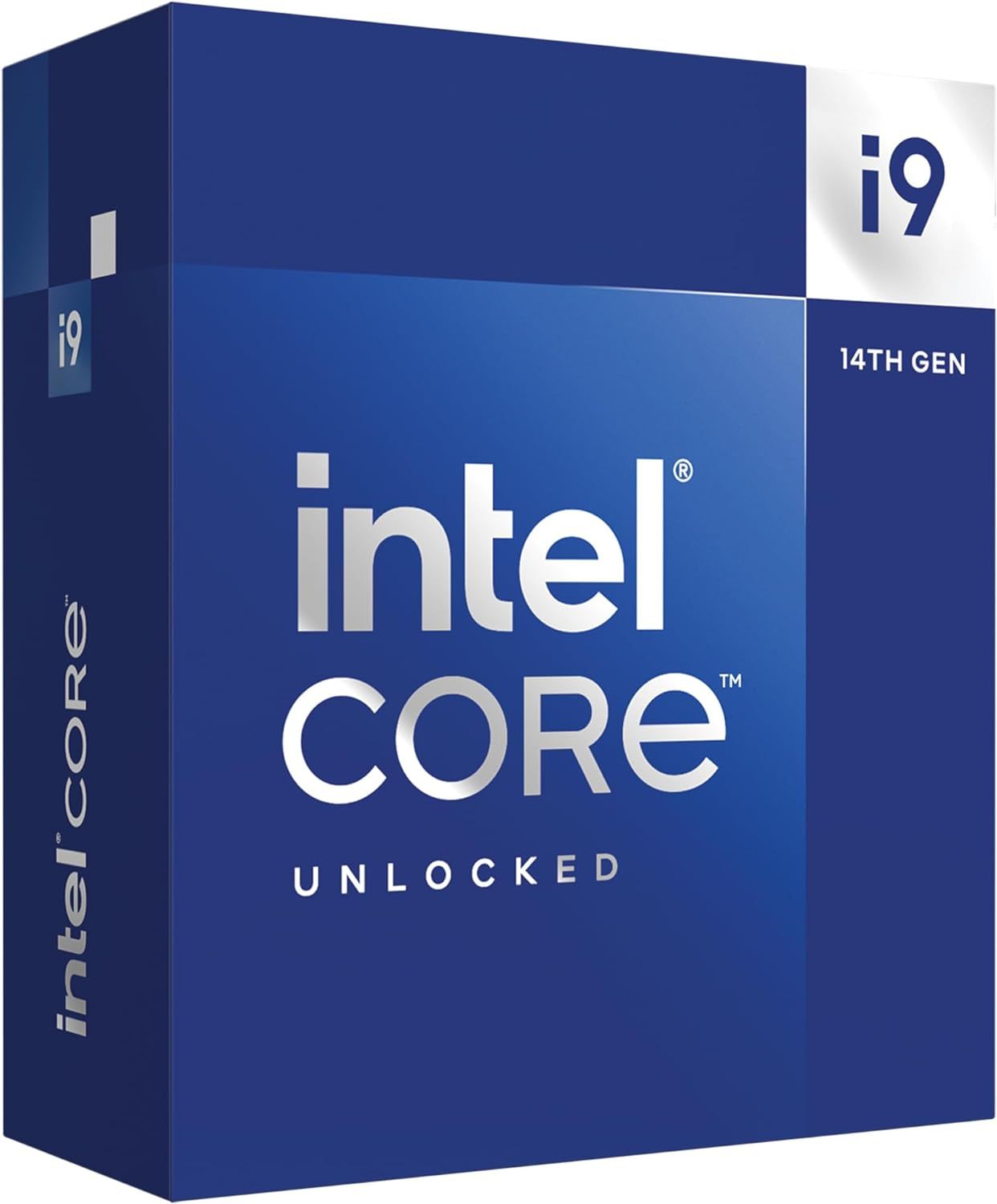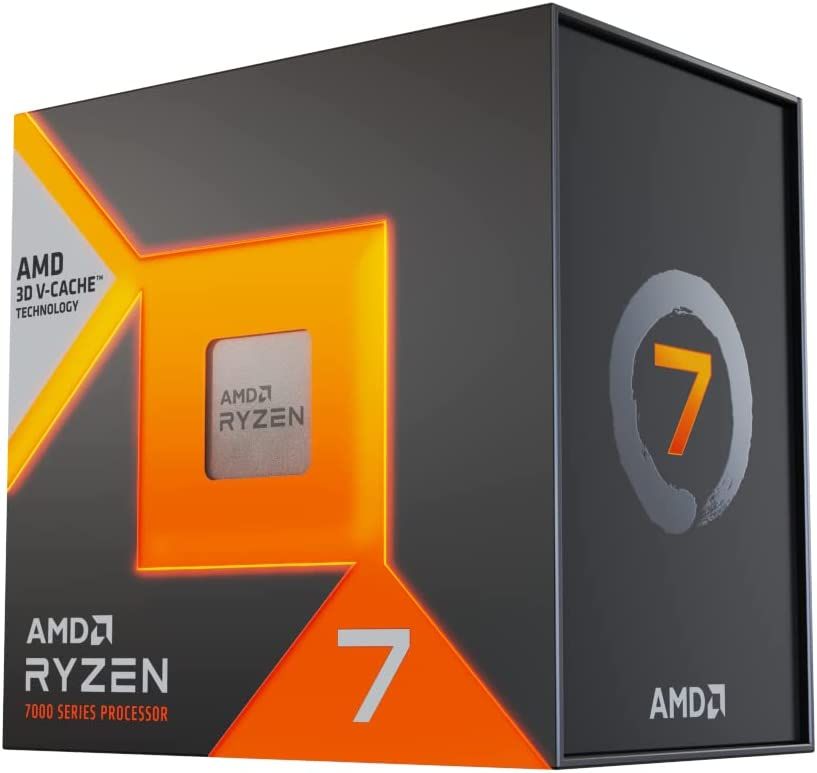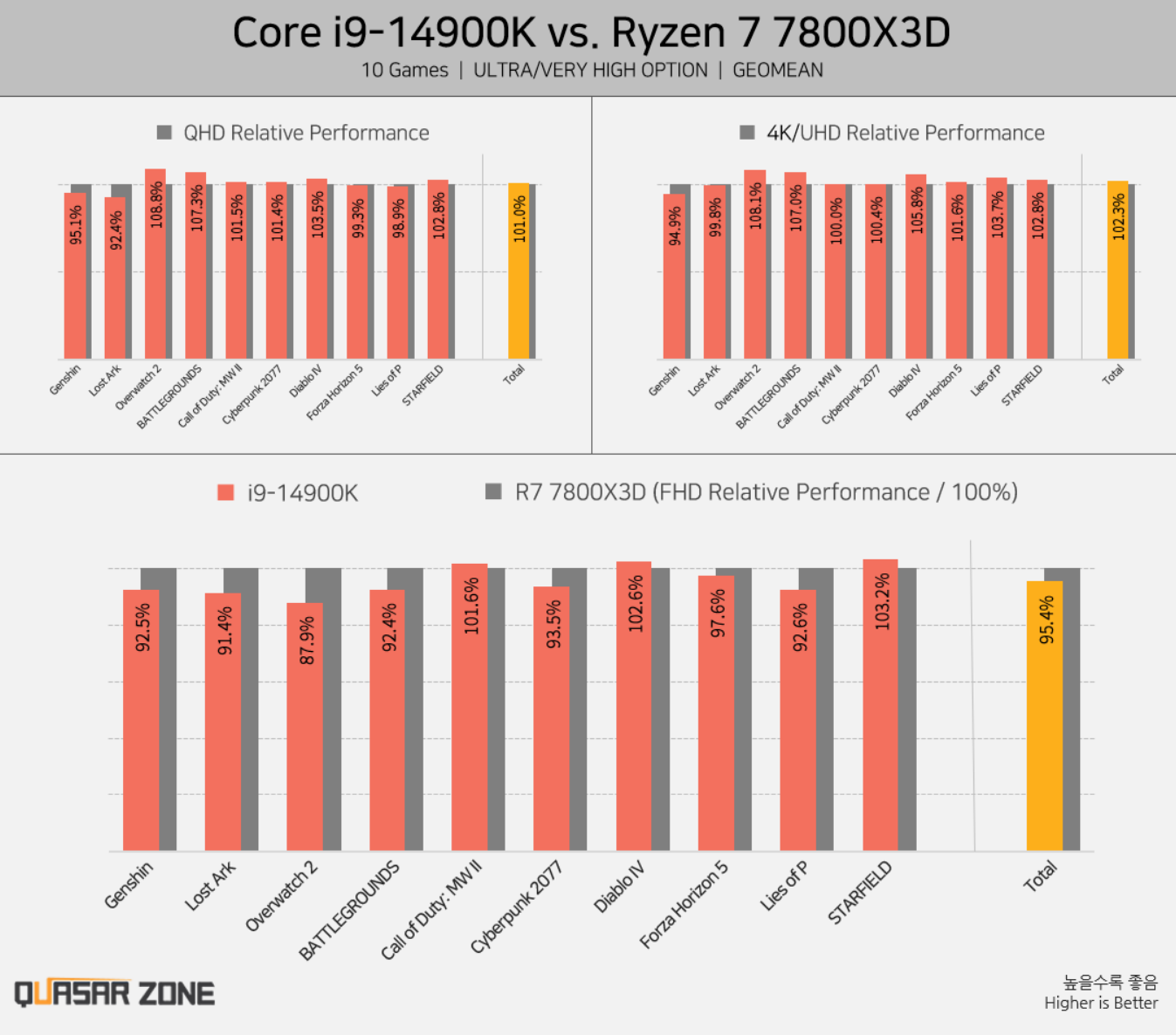-
Intel Core i9 14900K 24-Core, 32-Thread CPU
$576 $650 Save $74
The Intel Core i9 14900K 24-Core, 32-Thread CPU is Intel’s highest-end 14th generation CPU and offers the highest boost clocks for a consumer-grade CPU from Intel to date, clocking in at an impressive 6 GHz natively.
It succeeds the limited-release Intel Core 13900KS as the first mainstream 6 GHz CPU, even as it brings a large power draw and thermal requirement in tow to reach said clock speed.
Pros- High Single Core Clocks (up to 6GHz)
- Excellent multi-core performance
- Works with 12th and 13th gen motherboards
Cons- Power Hungry versus the competition
- Requires a powerful cooler
-
AMD Ryzen 7 7800X3D
$370 $450 Save $80
The AMD Ryzen 7 7800X3D is AMD’s latest and greatest CPU when it comes to gaming. With an excellent and highly efficient gaming performance that tops the charts currently, the Ryzen 7 7800X3D is here to stay and has a crown to claim thanks to its 3D V-Cache-enabled prowess when it comes to gaming on a PC.
The octa-core CPU currently happens to be the fastest in the business for gaming even as it leads efficiency charts at the top, making it a very sought-after gaming upgrade.
Pros- Excellent for gaming
- Very efficient compared to the competition
- Works with most aftermarket coolers easily
Cons- Somewhat disappointing multi-core performance
- Has limited boost potential
Highlights
- Intel’s 14th-gen CPUs receive mixed reviews due to their similarities to the previous generation.
- Users appreciate the maintained prices and compatibility of the refreshed CPUs.
- The 14th-gen CPUs offer a modest upgrade and target enthusiasts and users coming from older platforms.
Intel’s 14th-generation CPUs are being met with mixed reviews and tepid user sentiment. Much of that stems from how close the newer generation is to the old one, with the aptly titled ‘Raptor Lake Refresh‘ essentially being just a slightly better version of the preceding 13th-generation CPUs.
At the same time, users are appreciating both the added value from Intel maintaining prices while still offering better performance, and the compatibility of the refreshed CPUs, which work with essentially any LGA 1700 motherboard out there. Most, if not all, 12th and 13th generation motherboards received BIOS updates recently.
This brings many questions to the table about the 14th-generation CPU lineup’s viability when it comes to raw performance, power consumption, and potential upgrades for users who have a 12th or 13th-generation CPU. The overwhelming consensus is that while the 14th generation is a modest upgrade over the 12th-generation CPUs, though a mild one over its 13th-generation equivalent processors. This new CPU generation is focused on targeting enthusiasts who upgrade each cycle, along with users coming from older Intel or AMD platforms.

Best PC Cases in 2024
These PC cases not only impress as showpieces but also allow CPUs and GPUs to perform optimally.
Why Is The Ryzen 7 7800X3D The Gaming CPU To Beat?
AMD’s Ryzen 7 7800X3D has yet to cede its position as the CPU to beat for gamers since its launch on the heels of the higher-end Ryzen 9 7900X3D and Ryzen 9 7950X3D, both of which it edges out when it comes to raw gaming performance. To do this, it leverages what AMD calls 3D V-cache, which is simply nomenclature talking about its large stacked L3 cache on top of the 8-core Zen 4-based CCD that has a significant performance bias for most games.
The question that needs to be answered for most users is whether the gaming-centric Ryzen 7 7800X3D offers an edge versus a now resurgent Raptor Lake flagship that can push as much as 6GHz clocks on single cores out of the box. This, coupled with the 14900K’s raw brute force, makes it an interesting head-to-head comparison below.
Head To Head: Intel Core i9 14900K Versus AMD Ryzen 7 7800X3D
A head-to-head comparison between the 24-core, 32-thread Intel Core i9 14900K and the 8-core, 16-thread Ryzen 7 7800X3D feels very much like a comparison between two different classes of hardware products. That is because they are exactly just that, with Intel leading the number-crunching, power-hungry charts for performance significantly, offering nearly twice the PassMark multicore score and a healthy lead in single-core performance below:
|
Processor Variant |
Intel Core I9 14900K |
AMD Ryzen 7 7800X3D |
|
Processor Family Codename |
Raptor Lake Refresh |
Raphael AM5 “Zen 4” |
|
Release Date |
Oct 17th 2023 |
April 6th 2023 |
|
Integrated Graphics |
Intel UHD 770 Graphics |
2-Core RDNA 2 |
|
Integrated Graphics Clock Speed |
1.65GHz |
2.2GHz |
|
Total Number of Cores |
24 |
8 |
|
Performance Cores |
8 |
8 |
|
Efficiency Cores |
16 |
N/A |
|
Number of threads |
32 |
16 |
|
Base Clock |
3.2GHz |
4.2GHz |
|
Boost Clock |
6GHz |
5.0GHz |
|
L2 Cache |
32MB |
8MB |
|
L3 Cache |
36MB |
96MB |
|
Native Memory Support |
Up to DDR5 5600 MT/s |
Up to DDR5 5200 MT/s |
|
Typical TDP |
125W |
125W |
|
Maximum TDP |
253W |
190W |
|
PassMark Multi-Core Score |
62653 |
34570 |
|
PassMark Single-Core Score |
4818 |
3758 |
|
Current Market Price |
$577 |
$370 |
It does, however, result in the AMD Ryzen 7 7800X3D having some understated qualities that make it such a strong gaming CPU candidate currently. It happens to be cheaper, significantly more efficient in terms of power draw, requires a less demanding cooling mechanism, and still manages to hold its own as the processor to beat for the gaming crown.
This does not mean that the Intel Core i9 14900K is a slouch by any measure. It offers 16 more efficiency cores, allowing it to dominate benchmarks and more demanding workloads in addition to higher single-core clocks. This allows it to get a lead in certain titles, such as Civilization 6, Diablo 4, and Starfield.
Intel Core i9 14900K: The Emperor In New Clothes

Intel Core i9 14900K 24-Core, 32-Thread CPU
Intel’s Fastest CPU Yet
$576 $650 Save $74
The Intel Core i9 14900K 24-Core, 32-Thread CPU is Intel’s highest-end 14th generation CPU and offers the highest boost clocks for a consumer-grade CPU from Intel to date, clocking in at an impressive 6 GHz natively.
It succeeds the limited-release Intel Core 13900KS as the first mainstream 6 GHz CPU, even as it brings a large power draw and thermal requirement in tow to reach said clock speed.
- Brand
- Intel
- CPU Model
- Core i9 14900K
- CPU Socket
- LGA 1700
- Cores
- 24 (8P + 16E)
- Threads
- 32
- Architecture
- Raptor Lake (Refresh)
- Process
- Intel 7 (10 nm)
- Base Clock Speed
- 3.2 GHz
- Boost Clock Speed
- 6 GHz
- Cache
- 32MB L2 + 36MB L3 Cache
- PCIe
- PCI-E 4.0/5.0 supported
- Graphics
- Intel UHD Graphics 770
- TDP
- 253 W
- Massive 24-core, 32-thread CPU in a small consumer-grade package
- Best single-core performance for any CPU currently
- Does better in gaming benchmarks at higher resolutions
- Arguably the fastest multi-core consumer-grade CPU
- Doesn’t offer much in terms of performance gains vs the 13900K
- Extremely poor performance per watt for gamers
- Runs extremely hot under load while requiring a high-end cooler
The Intel Core i9 14900K isn’t just a new CPU. To its naysayers, it is essentially a re-badged Core i9 13900KS with better pricing and availability, a notion that is hard to argue with given how closely it compares in benchmark tests. For others, however, in a PC market that sees nearly all hardware costs push upwards, getting better performance at essentially the same price that the 13900K commanded at launch ($589 as notified by Intel) and being able to make a linear upgrade from a lower end 12th or 13th generation CPU has its perks.
As Intel’s most expensive consumer-grade CPU currently, the Intel Core i9 14900K offers significant power thanks to its 8-performance core, 16-efficiency core configuration that delivers a combined 32 threads for its mammoth $589 MSRP. At the same time, it is demanding in more ways than one. It requires a high-end motherboard with VRMs to handle its power draw at higher clocks, with a PSU that can handle its increased power demands. On the cooling end, it requires some of the best AIOs in the business to avoid any thermal throttling for a chip that can draw as much as 400W of power and generate heat in the same vein.
The Core i9 14900K is simply a slightly tweaked version of the 13900K, with higher clocks and power draw to boot. This makes it vulnerable to criticism from enthusiasts looking for something that comprehensively beats the competition in games and efficiency. That doesn’t make 14900K an inferior product for any new users, but one that will potentially allow consumers to hold off on an upgrade for longer than those who pass on it.
Intel does, however, have an ace up its sleeve, but only time will tell how effective it is. The company is pushing its APO (Intel Application Optimization) solution as a means to generate significantly higher frames than the competition by tweaking code on existing games that implement it for better handling by the Windows scheduler. Where implemented, it has been quite impressive, showcasing anywhere from 15 to 20% gains in frame rates.
This is also where its limitations may lie. It is limited to the penultimate Intel Core i7 14700K/KF and the Intel Core i9 14900K and its iGPU-less 14900KF variant. This means that games aiming to use this underlying tech are going to see gains only in Intel’s highest and second-highest tier of 14th-generation CPUs. This could effectively limit the implementation of APO in many titles until a more widespread launch with a 15th-generation CPU down the line. If it receives more widespread support over time, it could, however, essentially result in the 14900K wresting back the gaming crown from AMD’s CPUs this generation.
AMD Ryzen 7 7800X3D: Leveraging Cache Efficiently

AMD Ryzen 7 7800X3D
The Octa-Core Gaming CPU Of The Year
$399 $450 Save $51
The AMD Ryzen 7 7800X3D is AMD’s latest and greatest CPU when it comes to gaming. With an excellent and highly efficient gaming performance that tops the charts currently, the Ryzen 7 7800X3D is here to stay and has a crown to claim thanks to its 3D V-Cache-enabled prowess when it comes to gaming on a PC.
The octa-core CPU currently happens to be the fastest in the business for gaming even as it leads efficiency charts at the top, making it a very sought-after gaming upgrade.
- Brand
- AMD
- CPU Model
- Ryzen 7 7800X3D
- CPU Socket
- AM5
- Cores
- 8
- Threads
- 16
- PCIe 4.0 Support
- Yes, Supports up to PCI-E 5.0
- Architecture
- Zen 4
- Process
- 5nm
- Base Clock Speed
- 4.2GHz
- Boost Clock Speed
- 5.0GHz
- Cache
- 8MB L2 + 96MB L3
- TDP
- 120W
- iGPU
- Yes, Integrated Radeon 2 Core
- Currently the fastest gaming CPU across the board
- Runs very efficiently with a sub-50W power draw in most games
- Considerably more flexible when it comes to cooling options
- Lower clocks than the 7700X which could hurt productivity performance
The AMD Ryzen 7 7800X3D is an 8-core, 16-thread CPU that can best be summarized as a fusion of a slightly lower-clocked Ryzen 7 7700X, coupled with a chunk of L3 cache stacked on top. It follows the logic of “If it isn’t broken, don’t fix it,” applying the 3D V-Cache approach that made the 5800X3D a CPU that can still hold its own in modern games.
It continues to lead gaming charts with a healthy margin over both its higher-end, higher-core alternatives and Intel’s higher-clocked 13th and 14th-generation CPUs. This is despite Intel pushing higher clocks in the 14th generation in a bid to make them more competitive. However, the Ryzen 7 7800X3D is not a number-crunching behemoth. Due to the lower clocks it offers, it is generally slower than the Ryzen 7 7700X in most productivity-related workloads.
One could argue that the octa-core 7800X3D specializes in games only and caters exclusively to that market. This makes it unfair to compare it with higher core, higher clocked CPUs that are more general-purpose processors and more consistent in workloads that do not resemble games. That does mean that the Ryzen 7 does have its disadvantages for power users looking for a more well-rounded CPU for their needs.
For users looking for more power under the hood, the AMD Ryzen 9 7950X3D offers another octa-core CCD, taking its core count up to 16 versus the 8 that the Ryzen 7 7800X3D offers. This allows it to game nearly as well as the Ryzen 7 CPU while delivering massive gains on the productivity front as an alternative CPU to the Intel Core i9 14900K.
For gamers, however, the massively disproportionate discounts on the Ryzen 7 7800X3D coupled with its already better value for money for gaming PCs make it a no-brainer purchase versus its core-heavy sibling.
Intel Core i9 14900K Vs Ryzen 7 7800X3D: Gaming Performance Overview
The Core i9 14900K decimates the Ryzen 7 7800X3D in raw computing power because of its 8+16 core performance plus efficiency core configuration, versus the lower-clocked 8-core Zen 4 offerings that the latter brings to the table. At the same time, the Ryzen 7 7800X3D holds its own versus a processor that is at times twice as fast in non-gaming workloads.
Gaming benchmarks available via the South Korean site QuasarZone show the 7800X3D maintaining an overall lead in FHD titles, with the 14900K gaining ground at higher resolutions.
Most gaming benchmarks generally follow a rule-of-thumb approach of lowering the resolution as much as possible in a bid to discover how well a CPU can perform in a situation where a GPU bottleneck is not a factor. The South Korea-based hardware enthusiast site QuasarZone has tested both using the RTX 4090 FE and offered test results in FHD, 2K, and 4K. As expected, to a certain degree, the results in FHD (where there is no bottleneck in play) show that the Ryzen 7 7800X3D still holds its own as the faster gaming CPU, even as Intel’s Raptor Lake Refresh push aims to narrow the gap with the 14900K.
However, the tests also indicate that the higher clock speeds on the 14900K do come into play at higher resolutions, as a more visible bottleneck potentially limits the 7800X3D’s performance, with the 14900K winning slightly at the 2K and 4K benchmarks across a 10-game test bench. The difference is slightly more pronounced in the 4K benchmark, however.
The 4K benchmark puts the 7800X3D in an overall lead, but one that users could discount currently at higher resolutions with meaningful gains, as pointed out earlier in titles such as Starfield, PUBG: Battlegrounds, Overwatch 2, and Diablo 4. It also shows that while Intel can’t comprehensively beat the Ryzen 7 7800X3D, it does noticeably reduce the gap to the point that power users and gamers could overlook it, especially at higher resolutions.
It is important to point out that the most accurate benchmark would be to run at the lowest graphics settings and a low resolution (FHD or lower) to gauge the CPU’s potential in terms of raw performance. The tests above use a ‘very high’ graphics preset, which could skew graphs slightly for certain titles.
Intel Core i9 14900K Vs Ryzen 7 7800X3D: Value Proposition
The Intel Core i9 14900K clocks in at a high $589 MSRP, while the Ryzen 7 7800X3D commands an MSRP of $450. This difference, however, is amplified by a street price of $600 and $370, respectively, at the time of writing, with the latter processor dipping to as low as $350 during Amazon’s Prime Day and competing shopping events. This makes it a more David versus Goliath situation both in terms of core count and price points, even as both CPUs cater to slightly different audiences and overlap when it comes to enthusiast gamers.
Intel offers 24 cores and 32 threads for $590, which translates to slightly better performance per dollar spent when it comes to most benchmarks that involve number-crunching or workloads that are heavily multithreaded. Likewise, the Ryzen 7 7800X3D easily decimates it in value for money in terms of frames per second per dollar spent, thanks to its low price and de facto discount over the suggested retail price.
The most interesting part of comparing the Ryzen 7 7800X3D to the Intel Core i9 14900K is the power efficiency. This is relevant for multiple reasons. Primarily, the Ryzen 7 7800X3D runs at a low 50W versus the Intel Core i9 14900K, which can push near the 140-150W mark while gaming. This is important because the 14900K simply costs more to run in terms of raw power, and will cost more in the long run by as much as three times if CPU power alone is measured.
This would result in an overblown number, however, because the main power draw while gaming comes from the GPU, though a sub-100W power draw increase is nothing to scoff at since there is more than just the power draw in play here. Intel’s CPU requires better VRMs to perform to spec and therefore a better class of motherboard. This adds to its cost even further, especially when including the PSU considerations that some gamers might have to deal with due to the 14900K’s peak power draw, which in some cases hits as much as over 400W (not while gaming, however).
Likewise, cooling is another factor, with users having to invest significantly in the 14900K to factor in what is the hottest CPU chip across the board this generation in terms of TDP when under load. This adds to a significant amount of cost for users looking to run Intel’s finest CPU in all its glory.
The Verdict: All-Purpose Compute Versus Specialist Gaming CPU
At the end of the day, Intel’s 14900K CPU offers small performance gains, a core architecture akin to the 13900K, and a high single-core performance that allows it to perform in more than just games. However, it does come at a cost. Users lose power efficiency and are expected to invest heavily in better motherboards, power supplies, and cooling. It caters to power users, enthusiasts, and gamers alike.
The Ryzen 7 7800X3D is a different beast in its own right. It is a CPU designed purely for gaming. As such, it only caters to gamers, enthusiasts, or those who are otherwise looking to get a head start in their games and avoid CPU bottlenecks for the near future. It is not designed for power users, as while the CPU holds its own, it does significantly lose against higher-core, higher-clocked CPUs.
AMD itself acknowledges this, branding the Ryzen 7 7800X3D as a ‘for gamers’ CPU while marketing the higher-end Ryzen 9 7950X3D as a ‘for creators’ offering that should compete better in most non-gaming benchmarks versus the Core 14900K.
To explore more about Game Rant’s coverage and suggested builds for the 14900K, users can view the guides below:
For users wanting a more gaming-centric CPU, such as the 7800X3D, the Game Rant team has them covered with in-depth guides for gamers looking to get the most out of their new CPU:
FAQ
Q: What Is The Fastest CPU for Gaming?
The AMD Ryzen 7 7800X3D remains the fastest CPU for gaming since its release in April 2023 to date.
Q: What Is The Fastest CPU I Can Buy Currently?
The Intel Core i9 14900K is the fastest consumer-grade desktop CPU currently available based on a mix of gaming and productivity workloads, along with its high clocks (Up to 6GHz) and 24-core, 32-thread CPU offering.
#Intel #Core #14900K #AMD #Ryzen #7800X3D #Refresh





More Stories
Serum Tips and Tricks
Unpublished Satoru Iwata Interview About Nintendo DS and Wii Resurfaces After 20 Years
Battlefield V: Best Sniper Rifles, Ranked